Incorporating Interpersonal Communication Skills in Accounting Field
VerifiedAdded on 2023/06/05
|9
|2467
|166
AI Summary
This report explains how interpersonal communication skills such as listening, feedback, and questioning can be incorporated in the accounting field. It highlights the benefits of each skill and the challenges that hinder their incorporation. The report also provides recommendations to improve communication in accounting. The data used is from secondary sources of data such as academic journals and articles.
Contribute Materials
Your contribution can guide someone’s learning journey. Share your
documents today.

INTERPERSONAL COMMUNICATION SKILLS 1
Interpersonal communication skills
By
[Student’s name]
Course
Institution
Date
Interpersonal communication skills
By
[Student’s name]
Course
Institution
Date
Secure Best Marks with AI Grader
Need help grading? Try our AI Grader for instant feedback on your assignments.
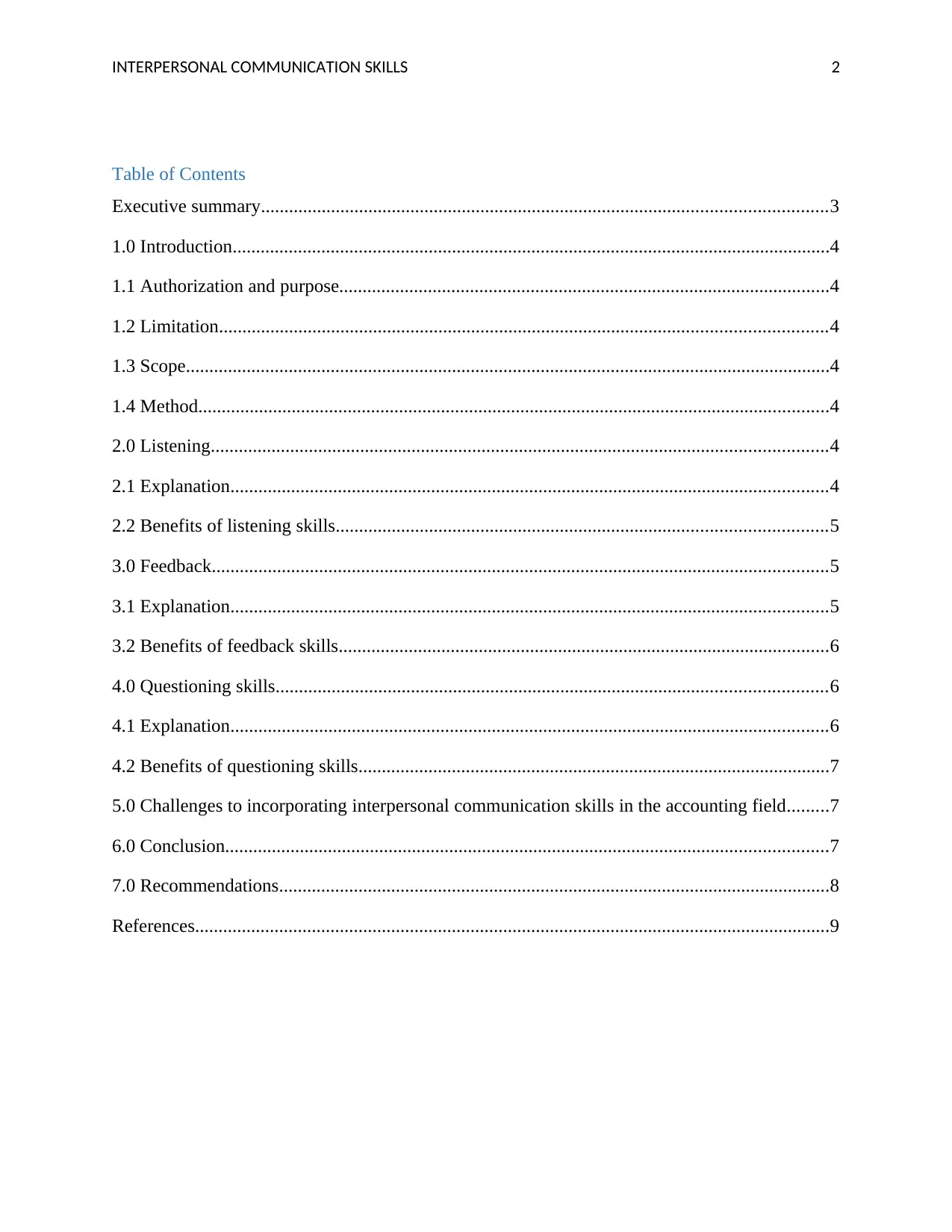
INTERPERSONAL COMMUNICATION SKILLS 2
Table of Contents
Executive summary.........................................................................................................................3
1.0 Introduction................................................................................................................................4
1.1 Authorization and purpose.........................................................................................................4
1.2 Limitation..................................................................................................................................4
1.3 Scope..........................................................................................................................................4
1.4 Method.......................................................................................................................................4
2.0 Listening....................................................................................................................................4
2.1 Explanation................................................................................................................................4
2.2 Benefits of listening skills.........................................................................................................5
3.0 Feedback....................................................................................................................................5
3.1 Explanation................................................................................................................................5
3.2 Benefits of feedback skills.........................................................................................................6
4.0 Questioning skills......................................................................................................................6
4.1 Explanation................................................................................................................................6
4.2 Benefits of questioning skills.....................................................................................................7
5.0 Challenges to incorporating interpersonal communication skills in the accounting field.........7
6.0 Conclusion.................................................................................................................................7
7.0 Recommendations......................................................................................................................8
References........................................................................................................................................9
Table of Contents
Executive summary.........................................................................................................................3
1.0 Introduction................................................................................................................................4
1.1 Authorization and purpose.........................................................................................................4
1.2 Limitation..................................................................................................................................4
1.3 Scope..........................................................................................................................................4
1.4 Method.......................................................................................................................................4
2.0 Listening....................................................................................................................................4
2.1 Explanation................................................................................................................................4
2.2 Benefits of listening skills.........................................................................................................5
3.0 Feedback....................................................................................................................................5
3.1 Explanation................................................................................................................................5
3.2 Benefits of feedback skills.........................................................................................................6
4.0 Questioning skills......................................................................................................................6
4.1 Explanation................................................................................................................................6
4.2 Benefits of questioning skills.....................................................................................................7
5.0 Challenges to incorporating interpersonal communication skills in the accounting field.........7
6.0 Conclusion.................................................................................................................................7
7.0 Recommendations......................................................................................................................8
References........................................................................................................................................9
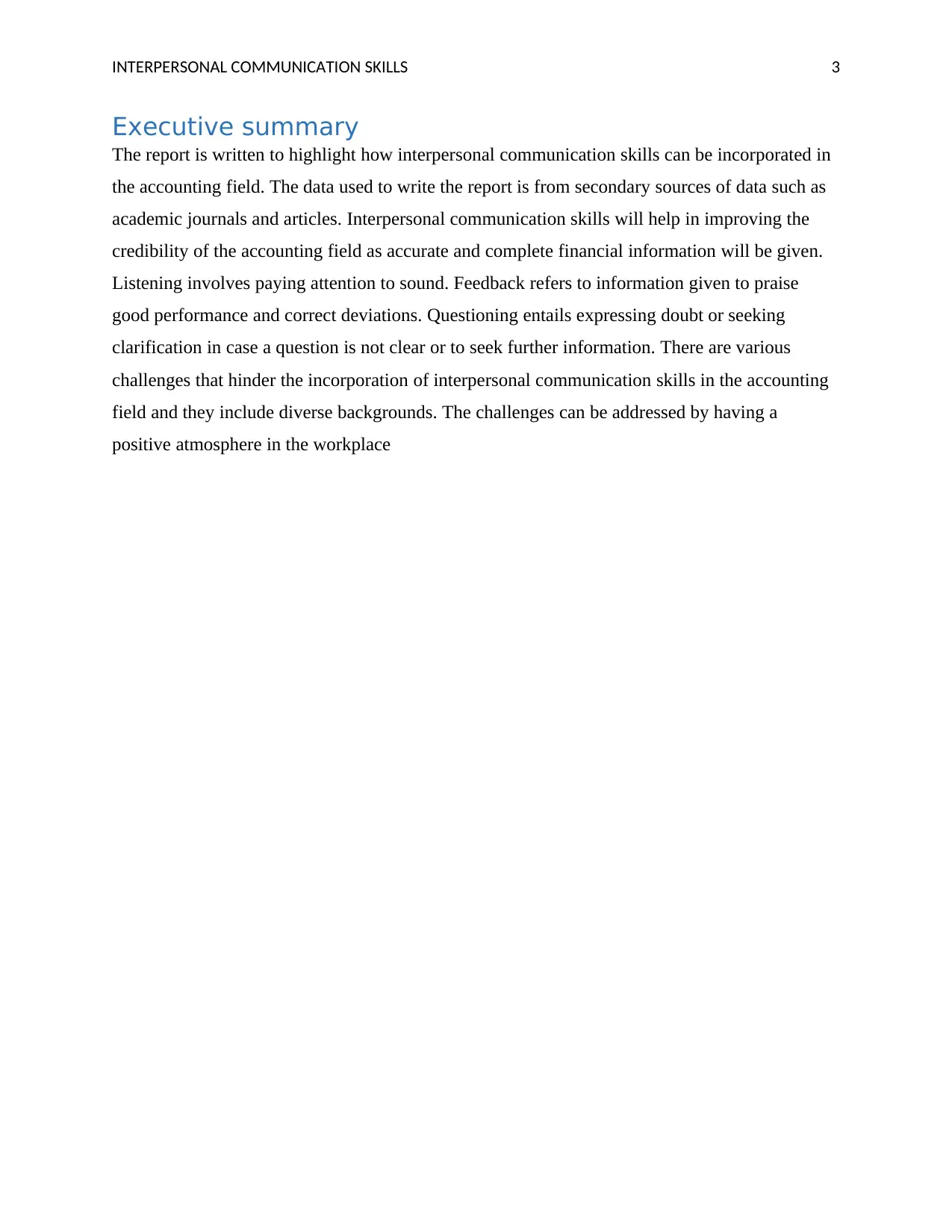
INTERPERSONAL COMMUNICATION SKILLS 3
Executive summary
The report is written to highlight how interpersonal communication skills can be incorporated in
the accounting field. The data used to write the report is from secondary sources of data such as
academic journals and articles. Interpersonal communication skills will help in improving the
credibility of the accounting field as accurate and complete financial information will be given.
Listening involves paying attention to sound. Feedback refers to information given to praise
good performance and correct deviations. Questioning entails expressing doubt or seeking
clarification in case a question is not clear or to seek further information. There are various
challenges that hinder the incorporation of interpersonal communication skills in the accounting
field and they include diverse backgrounds. The challenges can be addressed by having a
positive atmosphere in the workplace
Executive summary
The report is written to highlight how interpersonal communication skills can be incorporated in
the accounting field. The data used to write the report is from secondary sources of data such as
academic journals and articles. Interpersonal communication skills will help in improving the
credibility of the accounting field as accurate and complete financial information will be given.
Listening involves paying attention to sound. Feedback refers to information given to praise
good performance and correct deviations. Questioning entails expressing doubt or seeking
clarification in case a question is not clear or to seek further information. There are various
challenges that hinder the incorporation of interpersonal communication skills in the accounting
field and they include diverse backgrounds. The challenges can be addressed by having a
positive atmosphere in the workplace
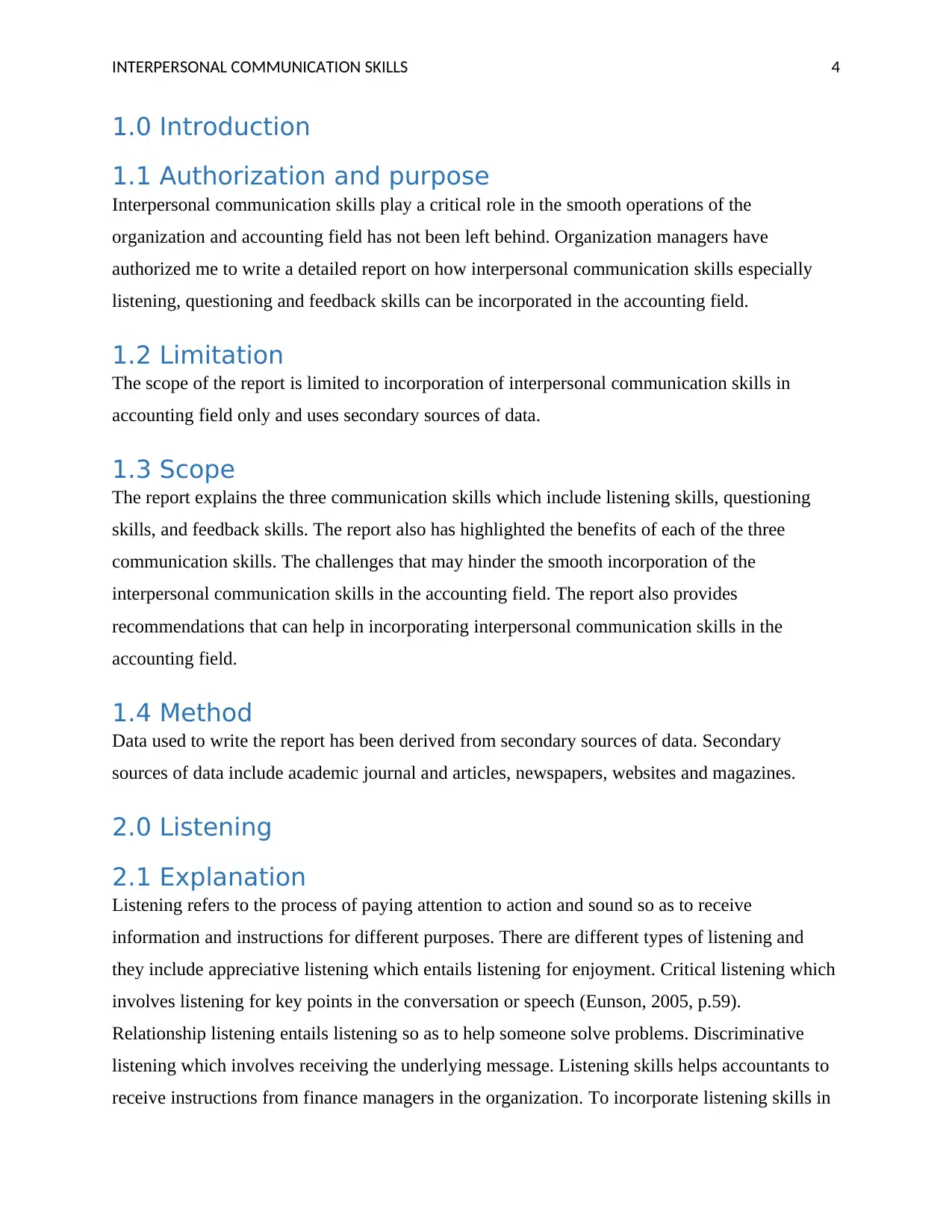
INTERPERSONAL COMMUNICATION SKILLS 4
1.0 Introduction
1.1 Authorization and purpose
Interpersonal communication skills play a critical role in the smooth operations of the
organization and accounting field has not been left behind. Organization managers have
authorized me to write a detailed report on how interpersonal communication skills especially
listening, questioning and feedback skills can be incorporated in the accounting field.
1.2 Limitation
The scope of the report is limited to incorporation of interpersonal communication skills in
accounting field only and uses secondary sources of data.
1.3 Scope
The report explains the three communication skills which include listening skills, questioning
skills, and feedback skills. The report also has highlighted the benefits of each of the three
communication skills. The challenges that may hinder the smooth incorporation of the
interpersonal communication skills in the accounting field. The report also provides
recommendations that can help in incorporating interpersonal communication skills in the
accounting field.
1.4 Method
Data used to write the report has been derived from secondary sources of data. Secondary
sources of data include academic journal and articles, newspapers, websites and magazines.
2.0 Listening
2.1 Explanation
Listening refers to the process of paying attention to action and sound so as to receive
information and instructions for different purposes. There are different types of listening and
they include appreciative listening which entails listening for enjoyment. Critical listening which
involves listening for key points in the conversation or speech (Eunson, 2005, p.59).
Relationship listening entails listening so as to help someone solve problems. Discriminative
listening which involves receiving the underlying message. Listening skills helps accountants to
receive instructions from finance managers in the organization. To incorporate listening skills in
1.0 Introduction
1.1 Authorization and purpose
Interpersonal communication skills play a critical role in the smooth operations of the
organization and accounting field has not been left behind. Organization managers have
authorized me to write a detailed report on how interpersonal communication skills especially
listening, questioning and feedback skills can be incorporated in the accounting field.
1.2 Limitation
The scope of the report is limited to incorporation of interpersonal communication skills in
accounting field only and uses secondary sources of data.
1.3 Scope
The report explains the three communication skills which include listening skills, questioning
skills, and feedback skills. The report also has highlighted the benefits of each of the three
communication skills. The challenges that may hinder the smooth incorporation of the
interpersonal communication skills in the accounting field. The report also provides
recommendations that can help in incorporating interpersonal communication skills in the
accounting field.
1.4 Method
Data used to write the report has been derived from secondary sources of data. Secondary
sources of data include academic journal and articles, newspapers, websites and magazines.
2.0 Listening
2.1 Explanation
Listening refers to the process of paying attention to action and sound so as to receive
information and instructions for different purposes. There are different types of listening and
they include appreciative listening which entails listening for enjoyment. Critical listening which
involves listening for key points in the conversation or speech (Eunson, 2005, p.59).
Relationship listening entails listening so as to help someone solve problems. Discriminative
listening which involves receiving the underlying message. Listening skills helps accountants to
receive instructions from finance managers in the organization. To incorporate listening skills in
Secure Best Marks with AI Grader
Need help grading? Try our AI Grader for instant feedback on your assignments.
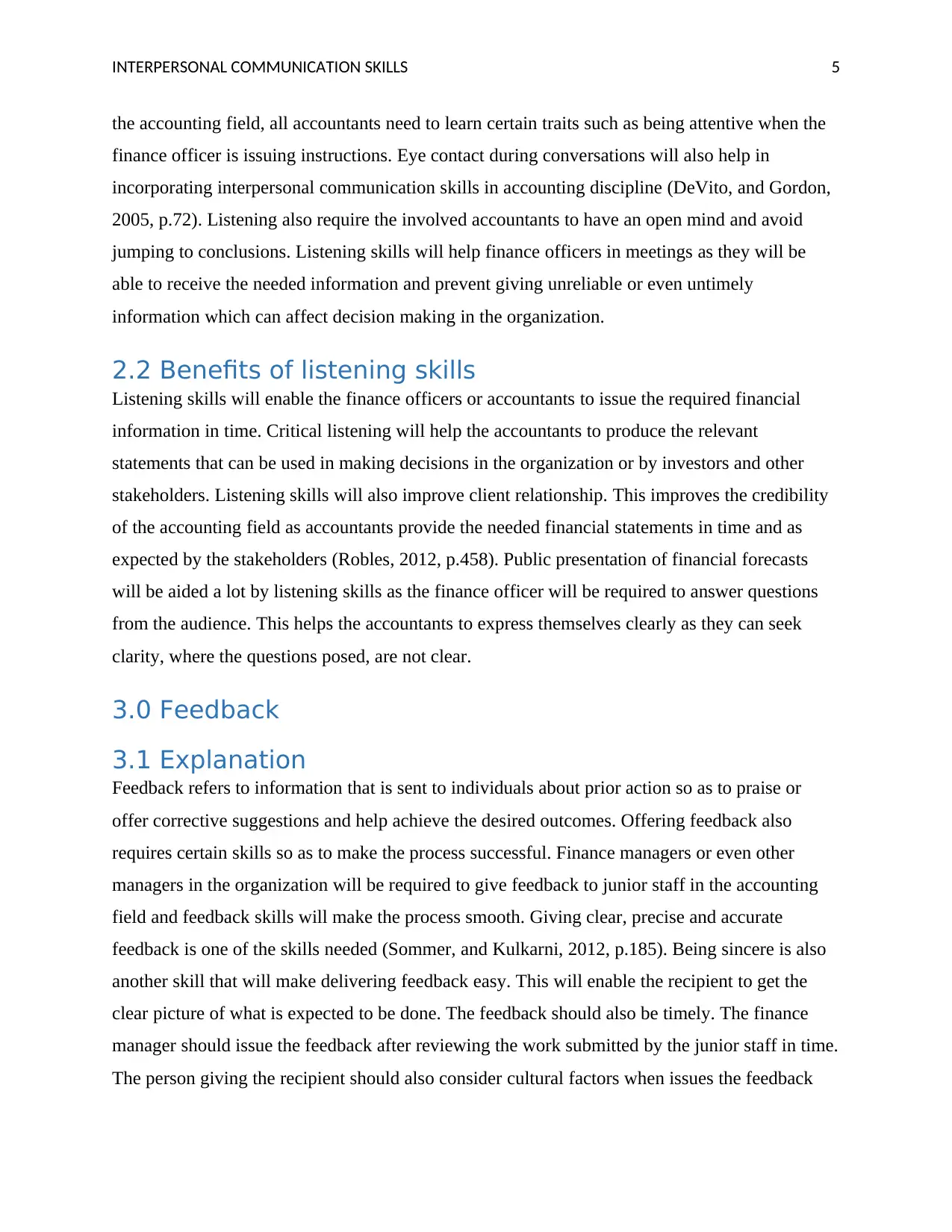
INTERPERSONAL COMMUNICATION SKILLS 5
the accounting field, all accountants need to learn certain traits such as being attentive when the
finance officer is issuing instructions. Eye contact during conversations will also help in
incorporating interpersonal communication skills in accounting discipline (DeVito, and Gordon,
2005, p.72). Listening also require the involved accountants to have an open mind and avoid
jumping to conclusions. Listening skills will help finance officers in meetings as they will be
able to receive the needed information and prevent giving unreliable or even untimely
information which can affect decision making in the organization.
2.2 Benefits of listening skills
Listening skills will enable the finance officers or accountants to issue the required financial
information in time. Critical listening will help the accountants to produce the relevant
statements that can be used in making decisions in the organization or by investors and other
stakeholders. Listening skills will also improve client relationship. This improves the credibility
of the accounting field as accountants provide the needed financial statements in time and as
expected by the stakeholders (Robles, 2012, p.458). Public presentation of financial forecasts
will be aided a lot by listening skills as the finance officer will be required to answer questions
from the audience. This helps the accountants to express themselves clearly as they can seek
clarity, where the questions posed, are not clear.
3.0 Feedback
3.1 Explanation
Feedback refers to information that is sent to individuals about prior action so as to praise or
offer corrective suggestions and help achieve the desired outcomes. Offering feedback also
requires certain skills so as to make the process successful. Finance managers or even other
managers in the organization will be required to give feedback to junior staff in the accounting
field and feedback skills will make the process smooth. Giving clear, precise and accurate
feedback is one of the skills needed (Sommer, and Kulkarni, 2012, p.185). Being sincere is also
another skill that will make delivering feedback easy. This will enable the recipient to get the
clear picture of what is expected to be done. The feedback should also be timely. The finance
manager should issue the feedback after reviewing the work submitted by the junior staff in time.
The person giving the recipient should also consider cultural factors when issues the feedback
the accounting field, all accountants need to learn certain traits such as being attentive when the
finance officer is issuing instructions. Eye contact during conversations will also help in
incorporating interpersonal communication skills in accounting discipline (DeVito, and Gordon,
2005, p.72). Listening also require the involved accountants to have an open mind and avoid
jumping to conclusions. Listening skills will help finance officers in meetings as they will be
able to receive the needed information and prevent giving unreliable or even untimely
information which can affect decision making in the organization.
2.2 Benefits of listening skills
Listening skills will enable the finance officers or accountants to issue the required financial
information in time. Critical listening will help the accountants to produce the relevant
statements that can be used in making decisions in the organization or by investors and other
stakeholders. Listening skills will also improve client relationship. This improves the credibility
of the accounting field as accountants provide the needed financial statements in time and as
expected by the stakeholders (Robles, 2012, p.458). Public presentation of financial forecasts
will be aided a lot by listening skills as the finance officer will be required to answer questions
from the audience. This helps the accountants to express themselves clearly as they can seek
clarity, where the questions posed, are not clear.
3.0 Feedback
3.1 Explanation
Feedback refers to information that is sent to individuals about prior action so as to praise or
offer corrective suggestions and help achieve the desired outcomes. Offering feedback also
requires certain skills so as to make the process successful. Finance managers or even other
managers in the organization will be required to give feedback to junior staff in the accounting
field and feedback skills will make the process smooth. Giving clear, precise and accurate
feedback is one of the skills needed (Sommer, and Kulkarni, 2012, p.185). Being sincere is also
another skill that will make delivering feedback easy. This will enable the recipient to get the
clear picture of what is expected to be done. The feedback should also be timely. The finance
manager should issue the feedback after reviewing the work submitted by the junior staff in time.
The person giving the recipient should also consider cultural factors when issues the feedback
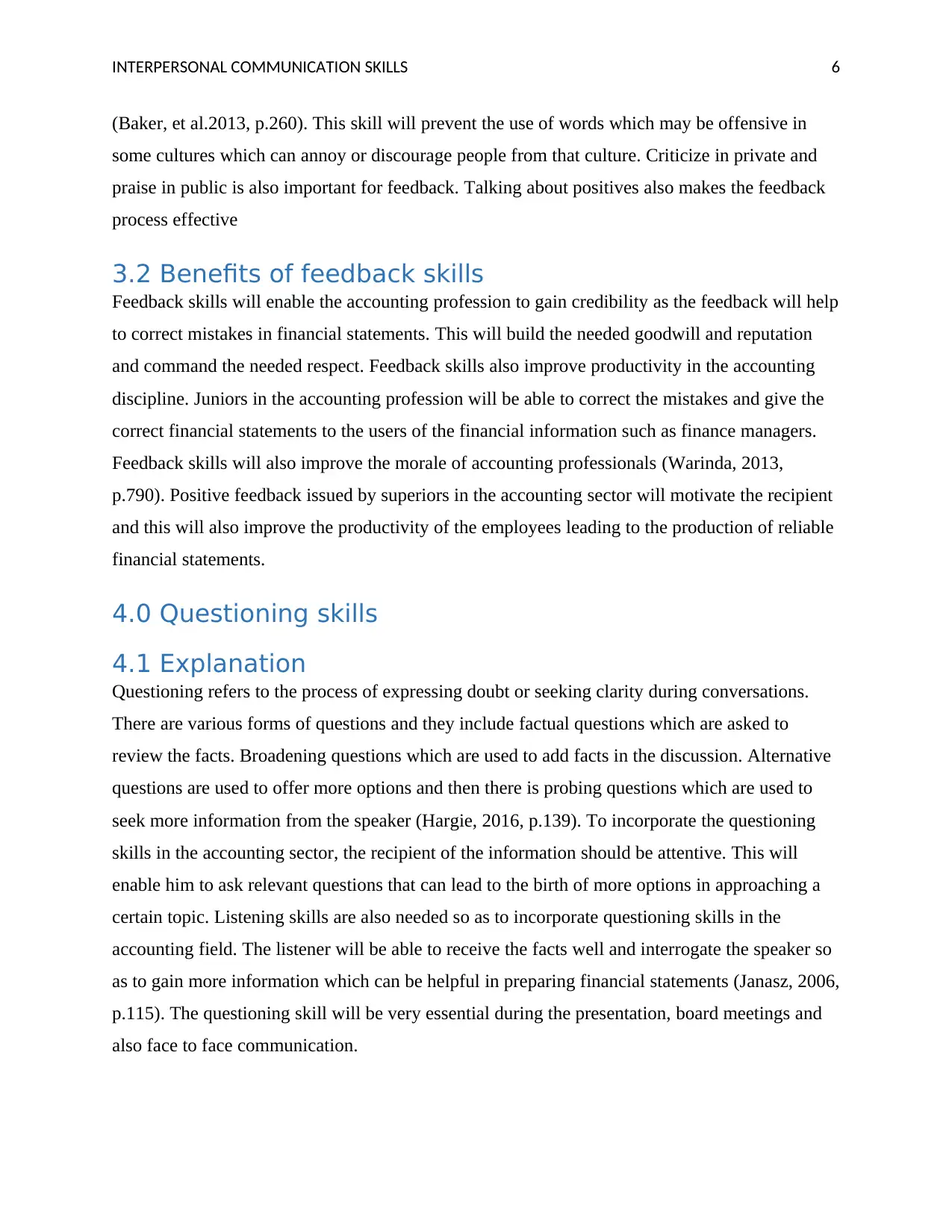
INTERPERSONAL COMMUNICATION SKILLS 6
(Baker, et al.2013, p.260). This skill will prevent the use of words which may be offensive in
some cultures which can annoy or discourage people from that culture. Criticize in private and
praise in public is also important for feedback. Talking about positives also makes the feedback
process effective
3.2 Benefits of feedback skills
Feedback skills will enable the accounting profession to gain credibility as the feedback will help
to correct mistakes in financial statements. This will build the needed goodwill and reputation
and command the needed respect. Feedback skills also improve productivity in the accounting
discipline. Juniors in the accounting profession will be able to correct the mistakes and give the
correct financial statements to the users of the financial information such as finance managers.
Feedback skills will also improve the morale of accounting professionals (Warinda, 2013,
p.790). Positive feedback issued by superiors in the accounting sector will motivate the recipient
and this will also improve the productivity of the employees leading to the production of reliable
financial statements.
4.0 Questioning skills
4.1 Explanation
Questioning refers to the process of expressing doubt or seeking clarity during conversations.
There are various forms of questions and they include factual questions which are asked to
review the facts. Broadening questions which are used to add facts in the discussion. Alternative
questions are used to offer more options and then there is probing questions which are used to
seek more information from the speaker (Hargie, 2016, p.139). To incorporate the questioning
skills in the accounting sector, the recipient of the information should be attentive. This will
enable him to ask relevant questions that can lead to the birth of more options in approaching a
certain topic. Listening skills are also needed so as to incorporate questioning skills in the
accounting field. The listener will be able to receive the facts well and interrogate the speaker so
as to gain more information which can be helpful in preparing financial statements (Janasz, 2006,
p.115). The questioning skill will be very essential during the presentation, board meetings and
also face to face communication.
(Baker, et al.2013, p.260). This skill will prevent the use of words which may be offensive in
some cultures which can annoy or discourage people from that culture. Criticize in private and
praise in public is also important for feedback. Talking about positives also makes the feedback
process effective
3.2 Benefits of feedback skills
Feedback skills will enable the accounting profession to gain credibility as the feedback will help
to correct mistakes in financial statements. This will build the needed goodwill and reputation
and command the needed respect. Feedback skills also improve productivity in the accounting
discipline. Juniors in the accounting profession will be able to correct the mistakes and give the
correct financial statements to the users of the financial information such as finance managers.
Feedback skills will also improve the morale of accounting professionals (Warinda, 2013,
p.790). Positive feedback issued by superiors in the accounting sector will motivate the recipient
and this will also improve the productivity of the employees leading to the production of reliable
financial statements.
4.0 Questioning skills
4.1 Explanation
Questioning refers to the process of expressing doubt or seeking clarity during conversations.
There are various forms of questions and they include factual questions which are asked to
review the facts. Broadening questions which are used to add facts in the discussion. Alternative
questions are used to offer more options and then there is probing questions which are used to
seek more information from the speaker (Hargie, 2016, p.139). To incorporate the questioning
skills in the accounting sector, the recipient of the information should be attentive. This will
enable him to ask relevant questions that can lead to the birth of more options in approaching a
certain topic. Listening skills are also needed so as to incorporate questioning skills in the
accounting field. The listener will be able to receive the facts well and interrogate the speaker so
as to gain more information which can be helpful in preparing financial statements (Janasz, 2006,
p.115). The questioning skill will be very essential during the presentation, board meetings and
also face to face communication.
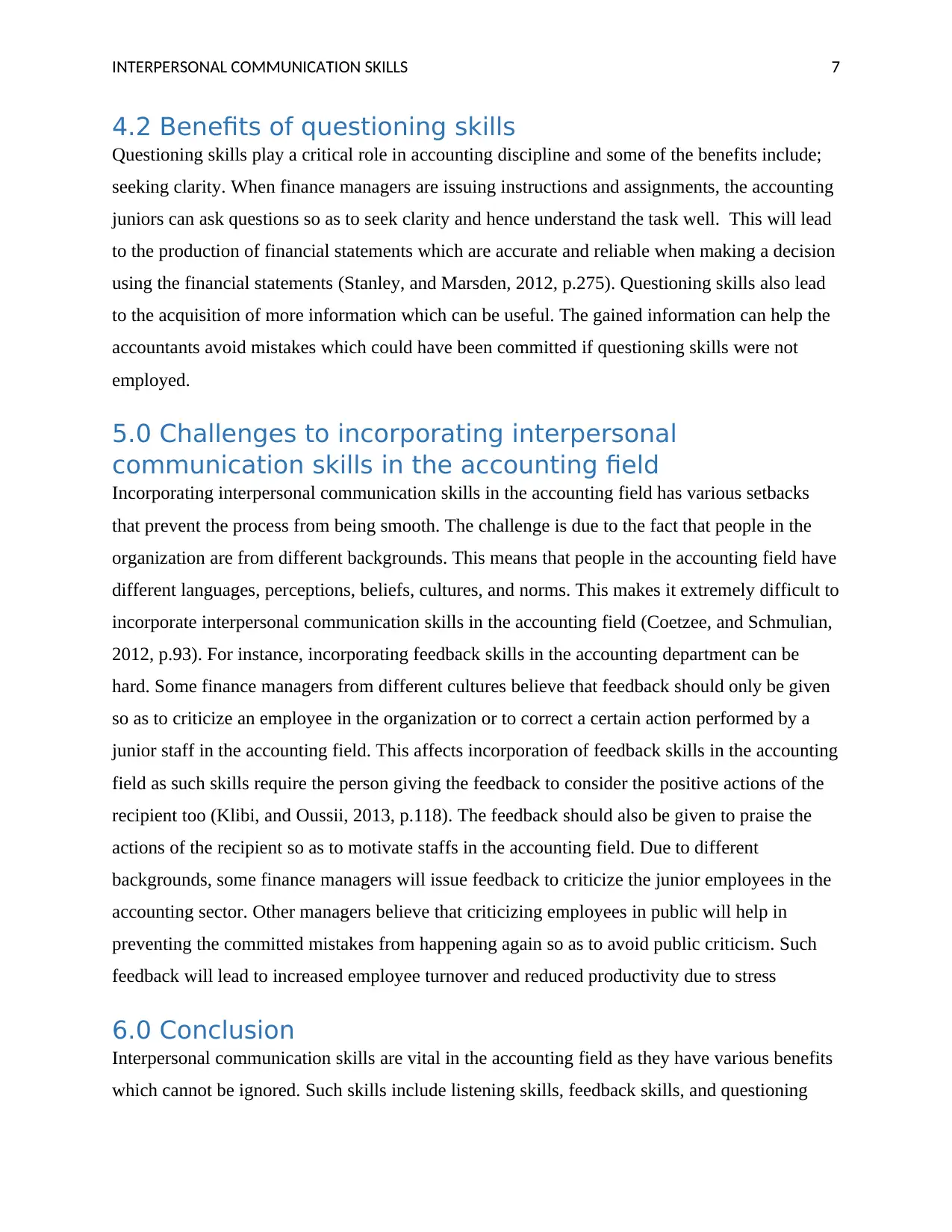
INTERPERSONAL COMMUNICATION SKILLS 7
4.2 Benefits of questioning skills
Questioning skills play a critical role in accounting discipline and some of the benefits include;
seeking clarity. When finance managers are issuing instructions and assignments, the accounting
juniors can ask questions so as to seek clarity and hence understand the task well. This will lead
to the production of financial statements which are accurate and reliable when making a decision
using the financial statements (Stanley, and Marsden, 2012, p.275). Questioning skills also lead
to the acquisition of more information which can be useful. The gained information can help the
accountants avoid mistakes which could have been committed if questioning skills were not
employed.
5.0 Challenges to incorporating interpersonal
communication skills in the accounting field
Incorporating interpersonal communication skills in the accounting field has various setbacks
that prevent the process from being smooth. The challenge is due to the fact that people in the
organization are from different backgrounds. This means that people in the accounting field have
different languages, perceptions, beliefs, cultures, and norms. This makes it extremely difficult to
incorporate interpersonal communication skills in the accounting field (Coetzee, and Schmulian,
2012, p.93). For instance, incorporating feedback skills in the accounting department can be
hard. Some finance managers from different cultures believe that feedback should only be given
so as to criticize an employee in the organization or to correct a certain action performed by a
junior staff in the accounting field. This affects incorporation of feedback skills in the accounting
field as such skills require the person giving the feedback to consider the positive actions of the
recipient too (Klibi, and Oussii, 2013, p.118). The feedback should also be given to praise the
actions of the recipient so as to motivate staffs in the accounting field. Due to different
backgrounds, some finance managers will issue feedback to criticize the junior employees in the
accounting sector. Other managers believe that criticizing employees in public will help in
preventing the committed mistakes from happening again so as to avoid public criticism. Such
feedback will lead to increased employee turnover and reduced productivity due to stress
6.0 Conclusion
Interpersonal communication skills are vital in the accounting field as they have various benefits
which cannot be ignored. Such skills include listening skills, feedback skills, and questioning
4.2 Benefits of questioning skills
Questioning skills play a critical role in accounting discipline and some of the benefits include;
seeking clarity. When finance managers are issuing instructions and assignments, the accounting
juniors can ask questions so as to seek clarity and hence understand the task well. This will lead
to the production of financial statements which are accurate and reliable when making a decision
using the financial statements (Stanley, and Marsden, 2012, p.275). Questioning skills also lead
to the acquisition of more information which can be useful. The gained information can help the
accountants avoid mistakes which could have been committed if questioning skills were not
employed.
5.0 Challenges to incorporating interpersonal
communication skills in the accounting field
Incorporating interpersonal communication skills in the accounting field has various setbacks
that prevent the process from being smooth. The challenge is due to the fact that people in the
organization are from different backgrounds. This means that people in the accounting field have
different languages, perceptions, beliefs, cultures, and norms. This makes it extremely difficult to
incorporate interpersonal communication skills in the accounting field (Coetzee, and Schmulian,
2012, p.93). For instance, incorporating feedback skills in the accounting department can be
hard. Some finance managers from different cultures believe that feedback should only be given
so as to criticize an employee in the organization or to correct a certain action performed by a
junior staff in the accounting field. This affects incorporation of feedback skills in the accounting
field as such skills require the person giving the feedback to consider the positive actions of the
recipient too (Klibi, and Oussii, 2013, p.118). The feedback should also be given to praise the
actions of the recipient so as to motivate staffs in the accounting field. Due to different
backgrounds, some finance managers will issue feedback to criticize the junior employees in the
accounting sector. Other managers believe that criticizing employees in public will help in
preventing the committed mistakes from happening again so as to avoid public criticism. Such
feedback will lead to increased employee turnover and reduced productivity due to stress
6.0 Conclusion
Interpersonal communication skills are vital in the accounting field as they have various benefits
which cannot be ignored. Such skills include listening skills, feedback skills, and questioning
Paraphrase This Document
Need a fresh take? Get an instant paraphrase of this document with our AI Paraphraser
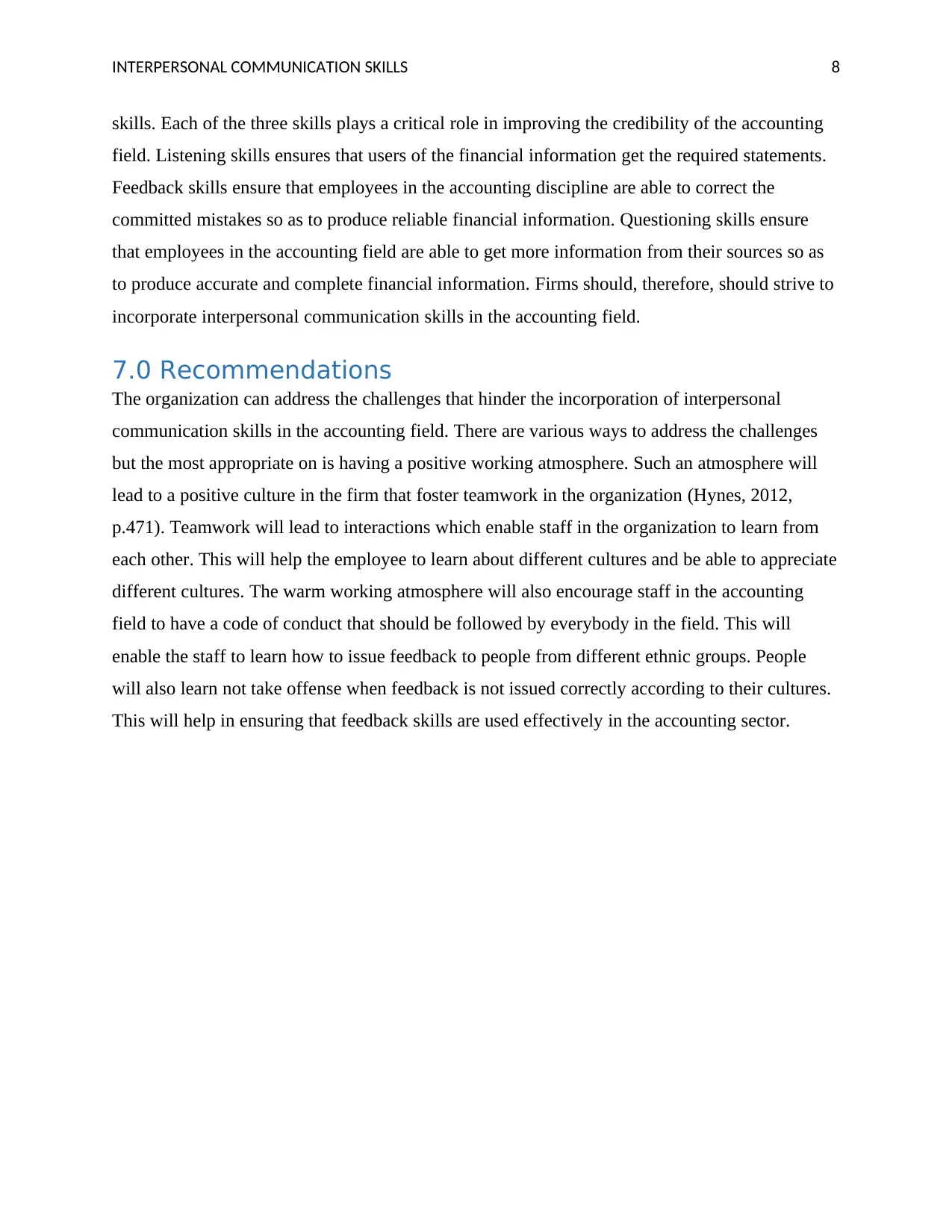
INTERPERSONAL COMMUNICATION SKILLS 8
skills. Each of the three skills plays a critical role in improving the credibility of the accounting
field. Listening skills ensures that users of the financial information get the required statements.
Feedback skills ensure that employees in the accounting discipline are able to correct the
committed mistakes so as to produce reliable financial information. Questioning skills ensure
that employees in the accounting field are able to get more information from their sources so as
to produce accurate and complete financial information. Firms should, therefore, should strive to
incorporate interpersonal communication skills in the accounting field.
7.0 Recommendations
The organization can address the challenges that hinder the incorporation of interpersonal
communication skills in the accounting field. There are various ways to address the challenges
but the most appropriate on is having a positive working atmosphere. Such an atmosphere will
lead to a positive culture in the firm that foster teamwork in the organization (Hynes, 2012,
p.471). Teamwork will lead to interactions which enable staff in the organization to learn from
each other. This will help the employee to learn about different cultures and be able to appreciate
different cultures. The warm working atmosphere will also encourage staff in the accounting
field to have a code of conduct that should be followed by everybody in the field. This will
enable the staff to learn how to issue feedback to people from different ethnic groups. People
will also learn not take offense when feedback is not issued correctly according to their cultures.
This will help in ensuring that feedback skills are used effectively in the accounting sector.
skills. Each of the three skills plays a critical role in improving the credibility of the accounting
field. Listening skills ensures that users of the financial information get the required statements.
Feedback skills ensure that employees in the accounting discipline are able to correct the
committed mistakes so as to produce reliable financial information. Questioning skills ensure
that employees in the accounting field are able to get more information from their sources so as
to produce accurate and complete financial information. Firms should, therefore, should strive to
incorporate interpersonal communication skills in the accounting field.
7.0 Recommendations
The organization can address the challenges that hinder the incorporation of interpersonal
communication skills in the accounting field. There are various ways to address the challenges
but the most appropriate on is having a positive working atmosphere. Such an atmosphere will
lead to a positive culture in the firm that foster teamwork in the organization (Hynes, 2012,
p.471). Teamwork will lead to interactions which enable staff in the organization to learn from
each other. This will help the employee to learn about different cultures and be able to appreciate
different cultures. The warm working atmosphere will also encourage staff in the accounting
field to have a code of conduct that should be followed by everybody in the field. This will
enable the staff to learn how to issue feedback to people from different ethnic groups. People
will also learn not take offense when feedback is not issued correctly according to their cultures.
This will help in ensuring that feedback skills are used effectively in the accounting sector.
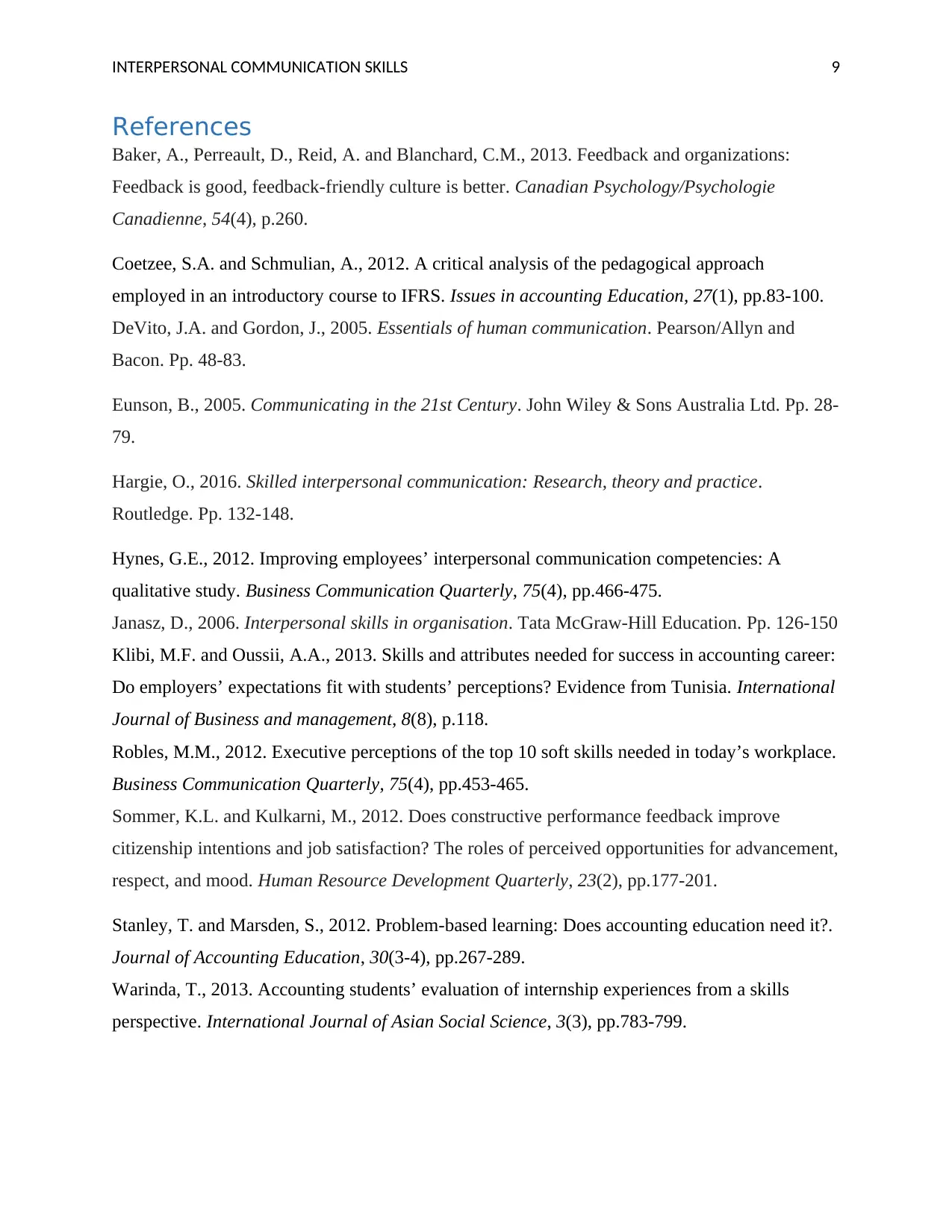
INTERPERSONAL COMMUNICATION SKILLS 9
References
Baker, A., Perreault, D., Reid, A. and Blanchard, C.M., 2013. Feedback and organizations:
Feedback is good, feedback-friendly culture is better. Canadian Psychology/Psychologie
Canadienne, 54(4), p.260.
Coetzee, S.A. and Schmulian, A., 2012. A critical analysis of the pedagogical approach
employed in an introductory course to IFRS. Issues in accounting Education, 27(1), pp.83-100.
DeVito, J.A. and Gordon, J., 2005. Essentials of human communication. Pearson/Allyn and
Bacon. Pp. 48-83.
Eunson, B., 2005. Communicating in the 21st Century. John Wiley & Sons Australia Ltd. Pp. 28-
79.
Hargie, O., 2016. Skilled interpersonal communication: Research, theory and practice.
Routledge. Pp. 132-148.
Hynes, G.E., 2012. Improving employees’ interpersonal communication competencies: A
qualitative study. Business Communication Quarterly, 75(4), pp.466-475.
Janasz, D., 2006. Interpersonal skills in organisation. Tata McGraw-Hill Education. Pp. 126-150
Klibi, M.F. and Oussii, A.A., 2013. Skills and attributes needed for success in accounting career:
Do employers’ expectations fit with students’ perceptions? Evidence from Tunisia. International
Journal of Business and management, 8(8), p.118.
Robles, M.M., 2012. Executive perceptions of the top 10 soft skills needed in today’s workplace.
Business Communication Quarterly, 75(4), pp.453-465.
Sommer, K.L. and Kulkarni, M., 2012. Does constructive performance feedback improve
citizenship intentions and job satisfaction? The roles of perceived opportunities for advancement,
respect, and mood. Human Resource Development Quarterly, 23(2), pp.177-201.
Stanley, T. and Marsden, S., 2012. Problem-based learning: Does accounting education need it?.
Journal of Accounting Education, 30(3-4), pp.267-289.
Warinda, T., 2013. Accounting students’ evaluation of internship experiences from a skills
perspective. International Journal of Asian Social Science, 3(3), pp.783-799.
References
Baker, A., Perreault, D., Reid, A. and Blanchard, C.M., 2013. Feedback and organizations:
Feedback is good, feedback-friendly culture is better. Canadian Psychology/Psychologie
Canadienne, 54(4), p.260.
Coetzee, S.A. and Schmulian, A., 2012. A critical analysis of the pedagogical approach
employed in an introductory course to IFRS. Issues in accounting Education, 27(1), pp.83-100.
DeVito, J.A. and Gordon, J., 2005. Essentials of human communication. Pearson/Allyn and
Bacon. Pp. 48-83.
Eunson, B., 2005. Communicating in the 21st Century. John Wiley & Sons Australia Ltd. Pp. 28-
79.
Hargie, O., 2016. Skilled interpersonal communication: Research, theory and practice.
Routledge. Pp. 132-148.
Hynes, G.E., 2012. Improving employees’ interpersonal communication competencies: A
qualitative study. Business Communication Quarterly, 75(4), pp.466-475.
Janasz, D., 2006. Interpersonal skills in organisation. Tata McGraw-Hill Education. Pp. 126-150
Klibi, M.F. and Oussii, A.A., 2013. Skills and attributes needed for success in accounting career:
Do employers’ expectations fit with students’ perceptions? Evidence from Tunisia. International
Journal of Business and management, 8(8), p.118.
Robles, M.M., 2012. Executive perceptions of the top 10 soft skills needed in today’s workplace.
Business Communication Quarterly, 75(4), pp.453-465.
Sommer, K.L. and Kulkarni, M., 2012. Does constructive performance feedback improve
citizenship intentions and job satisfaction? The roles of perceived opportunities for advancement,
respect, and mood. Human Resource Development Quarterly, 23(2), pp.177-201.
Stanley, T. and Marsden, S., 2012. Problem-based learning: Does accounting education need it?.
Journal of Accounting Education, 30(3-4), pp.267-289.
Warinda, T., 2013. Accounting students’ evaluation of internship experiences from a skills
perspective. International Journal of Asian Social Science, 3(3), pp.783-799.
1 out of 9
Related Documents
Your All-in-One AI-Powered Toolkit for Academic Success.
+13062052269
info@desklib.com
Available 24*7 on WhatsApp / Email
![[object Object]](/_next/static/media/star-bottom.7253800d.svg)
Unlock your academic potential
© 2024 | Zucol Services PVT LTD | All rights reserved.





